Another year has gone by! How time flies when you’re having fun and living in the future.
Last year, at the end of the season, I did a recap going over a few key statistics about the show. It’s really important for me to continue to think about what kind of show I’m making, who I’m featuring, and whether I’m making any progress on my goals. So this year I’m doing another post to check-in on how things are going and whether I hit my targets for diversity in the voices featured on Flash Forward.
SEASON 4 NUMBERS
Episodes: 20
Experts: 92
Gender ratio of those experts*: 42% men, 57% women, 1% nonbinary
Racial diversity of those experts*: 65% white, 35% POC
* these IDs are assumed by me, based on what I know of the guests. I did start asking guests for their pronouns this season, but I did not explicitly ask each of them to self-ID their gender or race. Next season I’m thinking about better ways to gather this data that doesn’t feel invasive.
(Last season’s numbers can be found here.)
At the end of the last season, I wrote that I wanted this season to increase the racial diversity of the experts on my show 10 percent, to feature 40 percent voices of color. I failed at that, only increasing the share by 5 percent. I’ve been thinking about that, and what I can do next season to get up to that 40 percent goal. I’ll quote myself from last year’s post about why this is important to me:
To me, one of the things that makes Flash Forward different from a lot of other tech and future related shows is that I try to focus on perspectives that don’t come purely out of a single white, straight, able-bodied, cis, male worldview. The future is for everyone, and white men aren’t the only ones who are building it. In fact, I’m convinced they’re almost always the least interesting ones building it. I’m committed to featuring more diverse voices in future seasons, to highlight the people you haven’t heard of, but should absolutely know about. So I think it’s important to be transparent about my numbers here, and I hope you all hold me accountable next season for this.
I’m making some big changes to the show next year, in terms of format and scope, and I think some of those changes are going to also help me highlight marginalized voices better too.
FUTURES
As Flash Forward marched on, so did time. Here’s an incomplete list of what happened over the last year in regards to all the futures we’ve covered on the show:
A Womb Away From Home (artificial wombs): Researchers successfully transplanted a uterus into a woman in 2016, and this year that woman gave birth to a healthy baby using that transplanted uterus.
The Moon is a Harsh Second Mistress (space pirates drag a second moon to earth): No new moon on the horizon (heh, heh) but China is sending a lander to the far side of the moon.
Forcing The Hand (all weapons are banned): It’s been a big year for conversations around gun control in the United States, after a series of mass shootings from a concert in Vegas, to a bar in Thousand Oaks, California, to a Synagogue in Pittsburgh, to Marjory Stoneman Douglas High School in Parkland Florida (I could go on, and on, but I won’t). Despite increasing public outcry, nothing much has changed. Dicks Sporting Goods announced it would take measures to reduce the number of guns sold, to be met with incredible backlash but a small but vocal set of gun owners.
The Most Dangerous Game (contact sports are banned): The evidence that sports like football are directly linked to chronic traumatic encephalopathy (CTE) has continued to grow. This year, a study found that at least 10% of NFL players could develop CTE.
Revenge of the Germs (antibiotic resistance): This continues to be a huge problem and there are so many things I could link to here, but I’m picking this amazing deep dive into killer tulips (yes, killer tulips) by Maryn McKenna, who was a guest on this episode.
Never Lay Me Down To Sleep (a drug to keep sleep away forever): One of the drugs we talked about in this episode is modafinil, which is used by astronauts and soldiers alike to stay awake during long missions. This year, people started pushing the DEA to change the classification of modafinil so that more people can legally take it.
The Day the Internet Broke (we abandon the internet): Who shuts down the internet most? According to data from Access Now, India, by a huge margin.
The Supernova Next Door (a nearby supernova goes off): This year some researchers proposed that a supernova 160 light years away from Earth was responsible for the extinction event that wiped out most of the giant marine animals.
The Bodybuilders (human augmentation becomes common): A research house named Gartner Inc. recently estimated that that “human augmentation market” would be worth $2.3 billion by 2025.
Grounded (commercial flight is banned): The IPCC put out a terrifying report this year on climate change, suggesting that while we could theoretically limit warming to acceptable limits we almost certainly wouldn’t. And it’s not just that flying contributes to the causes of climate change, flying is also going to be impacted by that said change.
Winded (airborne wind turbines alter the climate): Google spent the year quietly developing the Makani Energy Kite, and claims that they’ll be able to launch the airborne wind turbine technology soon.
Face to Face (facial recognition technology becomes common): So much to say on this one it’s hard to pick what to single out, so I’ll just go with the most recent thing I read: Taylor Swift reportedly used facial recognition technology at her concerts, secretly scanning attendees faces as they walked by kiosks.
Sunward Bound (the Earth falls into the sun): The likelihood of this future remains very, very, very low.
Eternal Life in Prison (longevity technology can keep prisoners alive for hundreds of years): Could the secret to longevity be locked up in a giant tortoise? Researchers are mining Lonely George’s DNA looking for clues to how the centurion tortoise managed to stay alive for so long, and how we might use that information in humans.
A Drone of One’s Own (everybody with a smartphone also has a drone): Lots on this one as well this year, but I think this piece on why drone policing still hasn’t really taken off is an interesting one.
Caged (all critically endangered animals live only in zoos): This year the very last male northern white rhino died of an infection.
The Empathy Machine (a device that can transmit emotions): Shameless plug here: I wrote about how the promise of VR as an empathy machine is overhyped at best and dangerous at worst.
Greetings (a Voyager-like probe shows up in our solar system): My favorite piece on the search for alien life published this year is this one by Rebecca Boyle.
Unseen (invisibility cloaks are real): This year, researchers starting thinking about whether the key to invisibility could come from within an object, instead of as a cloak.
The Climate Gene (people decide to genetically modify humans to cope with climate change): The idea of meddling with the genes of babies got very real this year.
Bye Bye Binary (nobody cares about gender anymore): A big good year for this! The gender binary is less and less a given in popular culture, including allowing for kids to register as nonbinary on school forms and more.
Crossing (all border crossing is dealt with by a global agency): Wow lots of border news this year, most of it horrifying. I’m not even sure how to succinctly sum up the level of horror being perpetuated by the US Government at the border right now.
Reputationville (there is a mass database for reputation scores):
Face Off (everybody goes faceblind): This isn’t likely to happen… basically ever. But here’s an interesting literature review about a controversy I knew nothing about. Basically, there’s a question about how closely connected the face and object recognition systems are in the brain. Faceblind people provide a great natural experiment here.
Love At First Sexbot (you can buy a sex robot): Here is where I again remind you that you should not take 99.9% of writing about sex robots seriously. This year was no exception. But here’s a fun thing about how sex robots as a concept have been around for a very, very long time.
Don’t Lie To Me (everybody wears lie detectors): Lie detectors are notoriously ineffective, but that doesn’t mean our future dystopian overlords won’t use them. Here’s a new startup that wants to use eyeballs to detect lies.
* The Ultimate Swatting (humans make mosquitos extinct): Google is continuing its experiment in eradicating mosquitoes in Fresno. Keep an eye on this one, because if this test case works then you’re going to see a lot of debate around whether we should scale it up in other places.
Micro But Mighty (your microbiome is used in medicine): The microbiome continues to be a hot research area, so lots of stuff happened this year. If you want to understand why it’s so important, read Ed Yong’s book I Contain Multitudes.
My Everything Pal (a totally quantified life): When we did this episode, the idea of quantified self deserved its own name. But now, it’s pretty much normal. Everything you do is monitored these days. On the episode we pondered whether this would change how we see ourselves — here’s another take on that.
Unpawful (pets are outlawed): Some pets already are banned in the US, like hedgehogs and ferrets in some states.
Tree Free (a world without paper): In 2013, the NHS in the UK was challenged to go paperless by 2018. As far as I can tell, that has not happened.
Rude Bot Rises (a world with conscious AI): We still don’t have a conscious AI, in part because we don’t really know what consciousness means in humans.
Swipe Right For Democracy (America goes to a direct democracy system): A lot of folks have opined about the “end of democracy” in the US and abroad over the last year. And there is a lot to say about that — in Wisconsin, for example, the GOP voted to strip power from the incoming Democrats. But in the Washington Post two writers argue that direct democracy is alive and well and local level, and should be celebrated.
Omnibot (universal translators): Amazon would like to sell you products in any language, and is hoping to train its Alexa products to recognize as many languages as possible.
Expiration Date (people know their death dates): You still can’t find this information out, whether that’s good or not is I think still in the air. But here’s an interesting paper on one of the concepts we cover in the episode, terror management theory. In doctors, it can manifest in really, really dangerous ways.
Popnonymous (all pop stars are avatars): We’re getting avatars of dead pop stars on tour soon! Amy Winehouse might be first — but many fans aren’t happy about it.
Kaboom (all volcanoes erupt at once): Hawaii’s Kilauea went off this year, destroying over 700 homes.
Bot For Teacher (robots replace teachers): There’s a lot of excitement about robotic teaching assistants right now. Most of them focus on students with disabilities. Here’s a thread from Sam Crane on why that might not be a great choice.
The Altered State (all drugs are legal): Vancouver is giving heroin to addicts, and it’s working to curb addiction.
Revenge of the Retweet (future politicians have online lives): Kevin Hart stepped down from hosting the Oscars after several of his old homophobic Tweets were surfaced.
Where’s the Beef? (meat is banned): Meat won’t be banned any time soon I don’t think, but the question of “what is meat” is actually more interesting than you might think, given the new cultured-meat products entering the market.
The Witch Who Came From Mars (an AI written future): 2018 was a witchy year in general!
How is Babby (Not) Made (perfect contraception): The Trump administration is trying to limit access to contraception, instead of increase it.
Extra! Extra! (fake news takes over): Wow, where to even begin on this one. There’s too much to say in one update, but here’s an interesting piece on some schools in France who are trying to teach kids what Tweets to trust.
Robocrop (farming is done by robots): What does a fully autonomous farm look like? You can now find one in San Carlos, CA. Although I have questions about what they mean by “fully autonomous.”
Greetings from Paradice (the Arctic becomes a tourist destination): The melting Arctic is going to totally change the way tourism works in the region, and this piece on Maritime Executive (yes a real site) talks about the various concerns that, uh, maritime executives have about it.
California Dreaming (California secedes from the United States): California secession kind of stalled out a bit this year, but one of the organizations behind it regrouped and started a… very strange initiative pushing for “the first ever autonomous Native American Nation in North America established by returning virtually all federally-owned properties to the Californian Native Americans.” As far as I can tell they consulted exactly zero actual Native Americans on this.
Unreel (anybody can make a video of you doing anything): Doctored footage was big news repeatedly this year but perhaps the most famous incident was the one with CNN reporter Jim Acosta, in which conservatives sped up a video to make it seem like he karate chopped an intern.
Robocop (a future without human police): Ford recently got a patent for autonomous police vehicles.
Mons Voyage (a future where tourists can visit Mars): NASA sent a new lander to Mars this year, called InSight, and it’s doing all sorts of interesting stuff.
Love on the Brain (matchmaking by brain waves): No real movement towards brainwave matchmaking, but there was some interesting work on using EEGs to monitor brain waves when they were watching films considered “tender.”
After Life (life on Earth is wiped out): Good news: still not happening. But N.K. Jemisin, who was a guest on this episode, won her third Hugo award this year making history as the first author to win three years in a row. Here’s her acceptance speech.
Piraceuticals (people start pirating pharmaceuticals): Scientists are starting to take “biohacked” medicine more seriously. Here’s a paper from some researchers about the risks and benefits of the Open Insulin Project.
Buzz Off (all the bees die): Bees are doing okay, but other insects are dying at alarming rates, making some biologists wonder if we’re about to be in seriously deep trouble.
Easy Bake Organs (printable replacement organs): You should take the “within the next five years” bit of this story with a very large grain of salt (everything in tech always seems to be “within the next five years”) but this holographic printing technology to create capillaries is really interesting.
Deceptible Me (self deception is turned off): In case you want to spiral into an existential crisis, here’s an essay I found called “Does Life Have Meaning? Or is it Self-Deception at Best and Terrifyingly Absurd at Worst?”
Our Father Who Art in Algorithm (an algorithmic super religion forms): If you want to join an AI-based religion, here’s a new one.
There’s No Great Future in Plastics (all plastics are banned): This year we saw people get very angry about plastic straws, which is a very weird story from start to finish. The statistic that was spread about how many are thrown away is bogus (it was generated by a 9-year-old kid for a science fair project using… let’s say imprecise methods) and the proposed and implemented bans would disproportionately harm disabled people.
Countless (the 2020 census fails): Lots of news here! Soon we’ll see a judge decide whether the citizenship question Trump has proposed for the census will stand or not.
You’ve Got Brainmail (scientists perfect brain to brain communication): Researchers at the University of Washington in Seattle have created a “social network” of three brains.
The Grey Dawn (senior care robots): Meet Zora, the robot caregiver much like the ones I talked about in this episode.
Fire From the Deep (underwater volcanoes erupt): The world’s deepest undersea volcano erupted between 2013 and 2015, and researchers didn’t even know it until this year.
Exercise in a Bottle (exercise is replaced by a drug): Cardarine remains popular among bodybuilders and powerlifters alike.
Enter the Exos (exoskeletons become commonly used): A company called Roam Robotics just raised $12 million to develop their skiing exoskeleton.
Federal Project Two (the federal government funds the arts): Very little movement towards a big federal arts funding initiative, despite a recent report from Americans for the Arts (so, you know, pretty clearly biased) saying that Americans are twice as likely to vote for candidates who support arts funding compared to those who don’t.
We Are Family (genetic testing becomes the norm): Elizabeth Warren made the news after this episode aired by taking a genetic test to “verify” her Native ancestry. It was a bad move. After the episode aired, news also broke that 23andMe announced that the giant pharma corporation GlaxoSmithKline would get exclusive rights to all the genetic data the company has gathered.
The Space Roomba (space junk gets cleaned up): Something we didn’t cover on the episode is how space junk could be the perfect hiding place for tiny spy satellites.
The Very Big Sick (the next big pandemic hits America): Here’s an interesting idea: the next pandemic might not come from the woods. It might come from a lab.
Portrait of the Artist as an Algorithm (a museum for AI created art open): After this episode went up, an algorithmically generated piece of art sold for $432,000 at auction.
Under The Sea (humans start living underwater): No real movement on living underwater, but here are the 2018 Underwater Photography of the Year Award winners and they’re SO COOL.
Dr. Doolittle (humans can talk to animals): Forget trying to decode an animals actual language, why not just turn to a psychic?
Spawn of Sponcon (people get paid to mention products in conversation): Having sponcon deals is so important to Instagram influencers that some of them are faking them.
Fungus Among Us (a brain controlling fungus infects humans): This gigantic (200-acres!) fungus could actually help scientists better understand cancer.
Money For Nothing (the world adopts a Universal Basic Income): Stanford is expanding their Basic Income lab to try and understand the potentials and pitfalls of a UBI.
Eyes In The Skies (smart dust becomes ubiquitous): In a recent document from the Trump administration limiting the kinds of technologies the U.S. is allowed to export to China, smart dust is actually mentioned.
Farm To Tablet (food pills replace meals): We’re no closer to food pills, but I wrote about how the woman who is credited with this idea actually didn’t seem to care about them at all.
What To Expect When You’re Expecting In Space (humans get pregnant in space): Past guest Lucianne Walkowicz is one of the experts interviewed for the new National Geographic TV show Mars, which features a very tiny storyline about a pregnancy on Mars.
The Commute From Hell (humans crack teleportation): Here’s a new paper on quantum teleportation!
Water Would Be Nice (the Rio Grande dries up): Most of the Rio Grande valley in the US is now simply under “abnormally dry” and not drought, which is great and also sad that that’s seen as a big win.
Snip Snip Snip (genetic editing becomes common): We’re pretty much caught up at this point! But here’s an article on what can go wrong when you CRISPR animals.

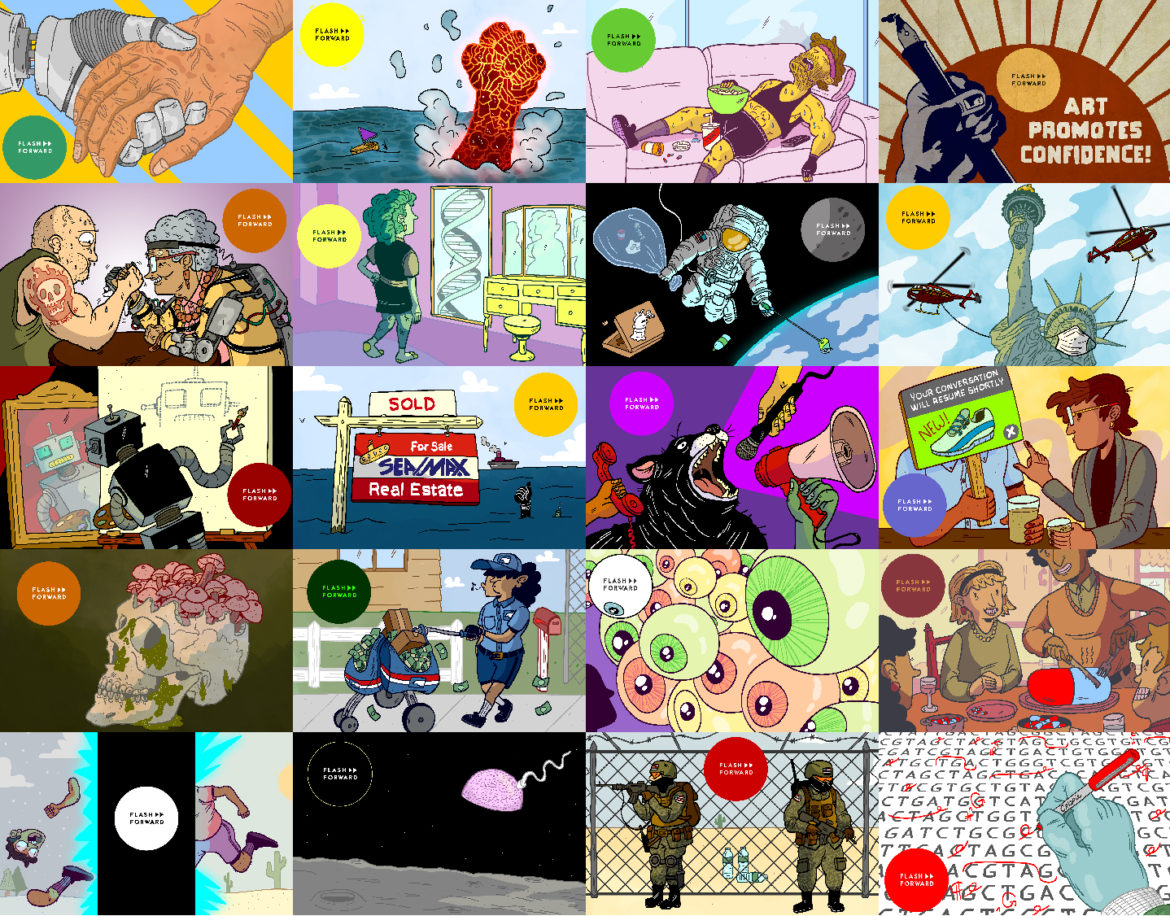





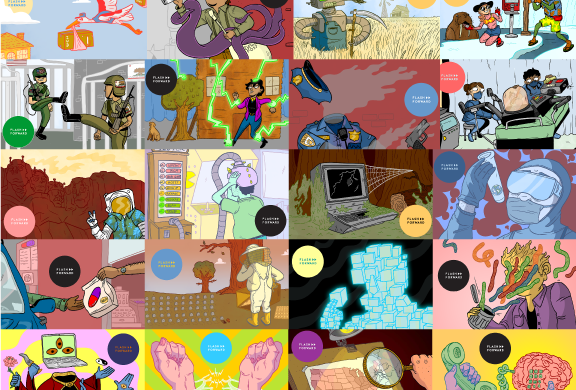
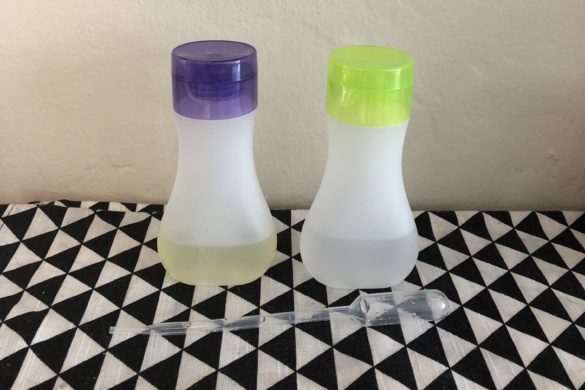
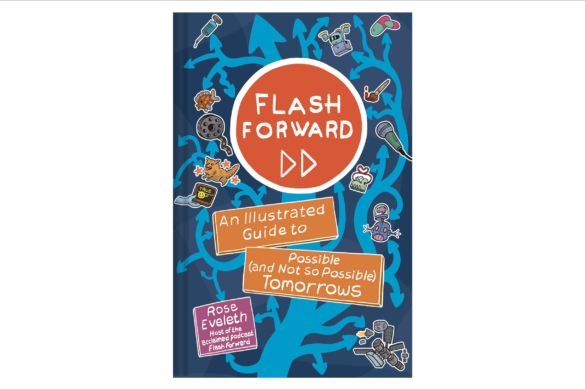

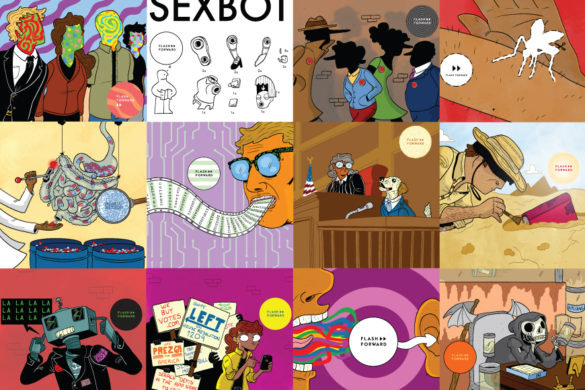
1 comment
[…] years I’ve wrapped up each season with a debrief and recap post like this one. (You can see 2019, 2018, and 2017 here. I have no clue where the 2016 post went but I’m going to spelunk into my archives […]